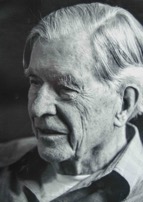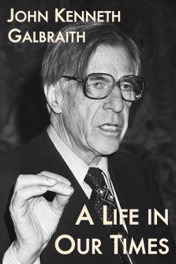
Galbraith became a US citizen in 1937, then spent a year as a research fellow at Cambridge University where he embraced Keynes’ new economic theories. After teaching economics at Princeton in 1939, Galbraith headed the price division in the Office of Price Administration in Washington where within two years, he managed to control the prices of virtually all goods and services in the country. Galbraith joined Fortune as a staff writer from 1943 to 1948, taking leave in 1945 to direct the US Strategic Bombing Survey, which concluded that the Allied bombing of Germany had been ineffective.
Galbraith worked on many political campaigns. He helped John F. Kennedy get elected President in 1960. Kennedy appointed him ambassador to India (1961-63). He advised Lyndon B. Johnson early in his administration but the escalating US involvement in Vietnam ended the relationship. In 1967, Galbraith became chairman of Americans for Democratic Action, a leading group opposing the Vietnam war. In 1968, he was a key supporter of Eugene McCarthy, whose candidacy helped drive Johnson from office. In 1972, he worked for George McGovern against Richard Nixon.
Galbraith's major economics books are American Capitalism (1952), The Affluent Society (1959), The New Industrial State (1967) and Economics and the Public Purpose (1973). His autobiography, A Life in Our Times, appeared in 1981.
Click on the cover for details about the eBook:




